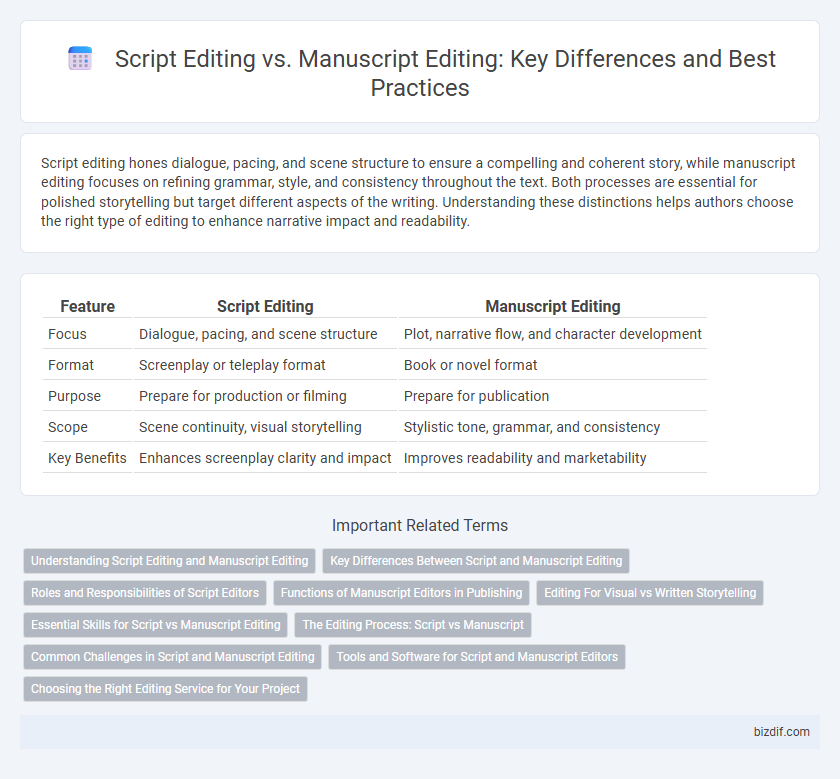Script editing hones dialogue, pacing, and scene structure to ensure a compelling and coherent story, while manuscript editing focuses on refining grammar, style, and consistency throughout the text. Both processes are essential for polished storytelling but target different aspects of the writing. Understanding these distinctions helps authors choose the right type of editing to enhance narrative impact and readability.
Table of Comparison
| Feature | Script Editing | Manuscript Editing |
|---|---|---|
| Focus | Dialogue, pacing, and scene structure | Plot, narrative flow, and character development |
| Format | Screenplay or teleplay format | Book or novel format |
| Purpose | Prepare for production or filming | Prepare for publication |
| Scope | Scene continuity, visual storytelling | Stylistic tone, grammar, and consistency |
| Key Benefits | Enhances screenplay clarity and impact | Improves readability and marketability |
Understanding Script Editing and Manuscript Editing
Script editing focuses on refining dialogue, pacing, and scene structure to enhance storytelling and ensure seamless flow for visual media. Manuscript editing addresses narrative coherence, character development, grammar, and style to prepare written content for publication. Both require distinct approaches tailored to the specific demands of scripts for performance and manuscripts for readers.
Key Differences Between Script and Manuscript Editing
Script editing involves refining dialogue, scene structure, and pacing to enhance visual storytelling, while manuscript editing focuses on narrative flow, character development, and descriptive language suited for readers. Script editors prioritize screenplay format and cinematic elements, whereas manuscript editors concentrate on prose clarity, grammar, and literary style. The key differences lie in format-specific goals and audience engagement techniques tailored to film scripts versus written manuscripts.
Roles and Responsibilities of Script Editors
Script editors focus on refining the narrative structure, character development, and dialogue flow to enhance storytelling and ensure continuity, whereas manuscript editors primarily concentrate on language mechanics, grammar, and style consistency. The roles and responsibilities of script editors include collaborating closely with writers to shape plot arcs, identifying pacing issues, and ensuring the script aligns with production constraints and creative vision. Script editors also provide detailed feedback to improve scene transitions and maintain overall coherence throughout the script.
Functions of Manuscript Editors in Publishing
Manuscript editors play a crucial role in publishing by refining the structure, clarity, and consistency of an author's draft to meet industry standards. Their functions include assessing narrative flow, enhancing character development, and ensuring grammatical accuracy to prepare the manuscript for the next stages of production. Unlike script editing, which focuses on dialogue and dramatization for performance, manuscript editing prioritizes the written content's readiness for publication.
Editing For Visual vs Written Storytelling
Script editing prioritizes pacing, dialogue clarity, and visual scene structure, ensuring the narrative flows seamlessly on screen. Manuscript editing emphasizes prose quality, character development, and narrative coherence to engage readers through vivid written storytelling. Both processes sharpen the story, but script editing adapts content for visual interpretation, while manuscript editing refines language and literary elements for reading.
Essential Skills for Script vs Manuscript Editing
Script editing requires a strong understanding of dialogue flow, pacing, and character development to ensure the narrative engages audiences visually and auditorily. Manuscript editing demands expertise in grammar, syntax, and literary style to enhance readability and coherence for print or digital publication. Both fields benefit from critical thinking and attention to detail, but script editors prioritize cinematic structure while manuscript editors focus on textual clarity.
The Editing Process: Script vs Manuscript
Script editing involves refining dialogue, pacing, and structure to enhance visual storytelling and dramatic impact, while manuscript editing focuses on narrative coherence, character development, and language clarity for written prose. The script editing process requires close collaboration with writers and directors to ensure scenes translate effectively on screen, whereas manuscript editing primarily involves improving flow, grammar, and stylistic consistency for readers. Both types of editing demand distinct techniques tailored to their format, emphasizing visual elements in scripts and literary quality in manuscripts.
Common Challenges in Script and Manuscript Editing
Script editing often grapples with dialogue coherence and scene transitions, requiring a focus on pacing and character development to maintain audience engagement. Manuscript editing typically faces challenges such as structural consistency, narrative flow, and stylistic clarity, ensuring the author's voice is preserved while enhancing readability. Both forms demand meticulous attention to plot holes, continuity errors, and tone alignment to produce polished, compelling content.
Tools and Software for Script and Manuscript Editors
Script editing requires specialized tools like Final Draft and Celtx, which offer features for formatting dialogue, managing scene structure, and script-specific notes. Manuscript editing relies on software such as Scrivener and Microsoft Word with advanced grammar checkers like Grammarly to handle large blocks of text, track changes, and provide style suggestions. Both editors benefit from collaboration platforms like Google Docs, but script editors prioritize tools designed for screenplay formatting, while manuscript editors focus on text consistency and narrative flow.
Choosing the Right Editing Service for Your Project
Script editing focuses on refining dialogue, pacing, and plot structure to enhance the screenplay's cinematic flow, while manuscript editing targets prose clarity, grammar, and narrative consistency in written works. Choosing the right editing service depends on your project's format and goals, such as selecting a script editor for film or television projects and a manuscript editor for novels or non-fiction books. Understanding these distinctions ensures optimized content quality tailored to your specific audience and medium.
Script Editing vs Manuscript Editing Infographic

 bizdif.com
bizdif.com